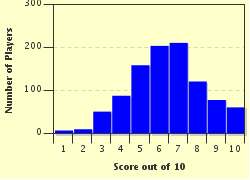Quiz Answer Key and Fun Facts
1. The Nitrogen Cycle: What is the main source that fixes nitrogen in a way that enables plants to use it?
2. Albert Einstein was a famous inventor.
3. What is the name of the chart listing all the elements?
4. Lumber (wood from trees) would be considered as a ________ resource.
5. Which of the following is an igneous rock?
6. How many phases of the moon are there?
7. In which layer of the atmosphere does the ozone layer of the Earth lie in?
8. What is the outermost layer of the atmosphere?
9. What forms of matter are used in the Water Cycle?
10. A volcano erupting would be considered as a rapid change of the Earth.
Source: Author
methane
This quiz was reviewed by FunTrivia editor
NatalieW before going online.
Any errors found in FunTrivia content are routinely corrected through our feedback system.


